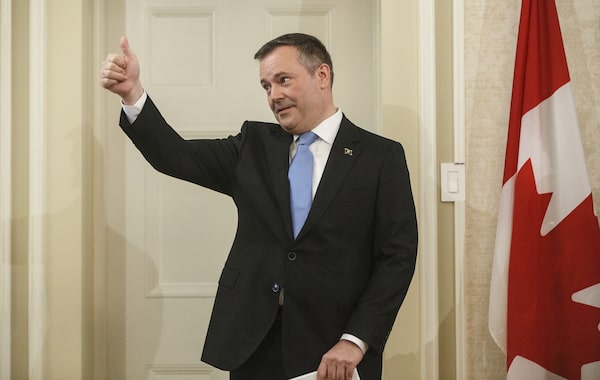
At his swearing-in Tuesday in Edmonton, Alberta Premier Jason Kenney called the oil sands emissions cap 'an academic abstraction.'JASON FRANSON/The Canadian Press
The federal government will exempt non-mining oil sands projects from impact-assessment reviews as long as Alberta’s new, United Conservative Party government maintains the province’s legislated cap on greenhouse gas emissions from the oil sands.
The exemption will apply despite the fact the previous NDP government of Rachel Notley never enacted regulations to give force to the emissions cap, according to documents released Wednesday by the Canadian Environmental Assessment Agency and Environment and Climate Change.
The government spelled out which proposed projects that would be subject to federal review under the Impact Assessment Act, a hotly contested bill that will overhaul the way Ottawa approves major resource projects.
Its decision to exempt non-mining oil sands projects – which use steam and solvents to extract bitumen – from impact assessments avoids a bruising political battle with new Premier Jason Kenney over the issue and satisfies a key demand of Ms. Notley and the oil and gas industry regarding the bill.
At his swearing-in Tuesday in Edmonton, Mr. Kenney called the oil sands emissions cap “an academic abstraction,” signaling he is neither prepared to enact legislation cancelling it nor pass the regulations needed to give it teeth.
“We always thought it was peculiar that Alberta alone amongst major energy producers would cap its future prosperity,” Mr. Kenney said. "Having said that, we are nowhere close to hitting a cap and we have not committed to amending the legislation.”
Mr. Kenney has railed against the federal legislation, Bill C-69, and is due to appear before a Senate committee Thursday to air his concerns over the bill, which has drawn angry reactions from the oil industry and its supporters. During the provincial election campaign, United Conservative Party officials indicated that a UCP government would likely scrap the cap and would oppose any effort by Ottawa to subject non-mining oil sands developments to federal reviews.
The Liberal government says the legislation provides greater environmental protections and a stronger voice for Indigenous communities in reviewing resource projects that affect them, while federal and provincial Conservatives argue it will kill development and jobs.
Editorial: Oil prices, pipelines and Jason Kenney’s impeccable timing
Opinion: Kenney’s attacks on oil sands critics won’t change anyone’s mind
The project list released Wednesday reveals which proposed developments are to receive full federal reviews by impact-assessment panels and which will not. It will include oil sands projects, but will exempt the non-mining projects – known as in situ – as long as provincial legislation caps the sector’s greenhouse gas emissions at 100 megatonnes annually.
The exemption will give the Alberta government time to work with oil sands companies to determine how to deal with the cap. However, Mr. Kenney indicated Tuesday that he has no intention of doing so. Without regulations, companies have no guidelines for complying the cap and the provincial energy regulator has no way to enforce it.
Some of the leading oil sands producers, including Suncor Energy Inc., Cenovus Energy Corp. and Husky Oil Ltd., have expressed support for the cap, saying it sends a signal to international investors that the sector is serious about reducing the emissions intensity of its operations. The companies are confident they can reduce their per-barrel emissions and not trigger the cap, even with strong production growth. Oil sands emissions sat at roughly 70 megatonnes in 2017 and were expected to hit 100 megatonnes by 2030 without significant improvements in the sector’s performance.
Federal Environment Minister Catherine McKenna argues that Canada can meet its international commitments to reduce emissions by 30 per cent below 2005 levels by 2030, even with continued growth in oil sands emissions up to the 100-megatonne cap.
However, the federal plan assumed that Ontario would reduce emissions by 37.5 per cent from 1990 levels by 2030, a goal set by the former, Liberal government. Progressive Conservative Premier Doug Ford has rolled back that ambition to be more in line with the national average of 30 per cent below 2005 levels.
The new regulations will also exempt offshore exploration oil wells from a federal review so long as there is a regional assessment completed. Such a regional review is now underway for offshore Newfoundland and Labrador. Development wells used to produce oil will still face a federal impact assessment.
Ottawa will also continue to assess new nuclear reactors or refurbishment of existing ones, but will exempt form full review the construction of small modular reactors that are built on already-licensed sites. The Canadian Nuclear Safety Commission would still have to issue permits for the small reactors.
One environmental lawyer complained the Liberals have weakened federal oversight by leaving important projects off the list. He also objected to the inclusion of proposed offshore wind energy projects that have more than 10 turbines.
“The proposed project list was written by CAPP,” Nature Canada lawyer Stephen Hazell said in reference to the Canadian Association of Petroleum Producers, the industry’s top lobbying group. “Not only does it ensure that no in-situ projects are assessed, [but] fewer pipelines and fewer coal mines will be assessed due to higher thresholds. The proposed list also discourages renewable energy by putting wind energy and tidal projects on the list.”